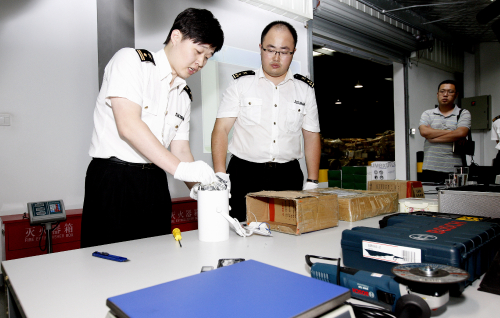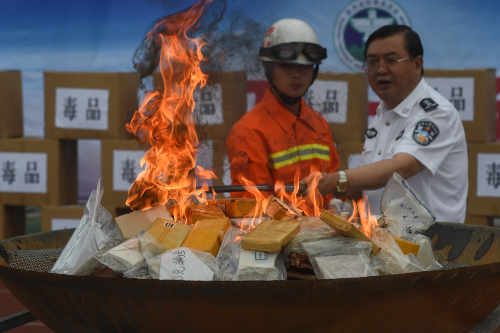|
 |
|
At a press conference held at Shanghai Pudong International Airport on June 16, customs officers demonstrate how narcotics were hidden inside an LED spot light (XINHUA) |
With drug abuse increasing in China, June 26, International Day Against Drug Abuse and Illicit Trafficking, saw a wide array of activities across the country to mark the occasion, which signaled an escalated fight against the menace.
"By the end of 2014, more than 2.9 million drug addicts had been registered; their actual number exceeded 14 million," said Liu Yuejin, Deputy Commissioner of the National Narcotics Control Commission (NNCC) and Assistant Minister of Public Security, at a press conference on June 24. It means approximately one out of 100 Chinese may be taking drugs, Liu pointed out.
On June 25, President Xi Jinping pledged an unswerving war against drugs, saying there would be "no rest until a sweeping victory."
At a meeting with groups and individuals recognized for their outstanding contributions to the anti-drugs battle, Xi said, "Drugs are a menace to society and a significant public security issue. They harm health, corrupt the will, destroy families, devastate wealth, and lead to other crimes."
China should have zero tolerance to drugs, he said, calling on all Party and governmental authorities to redouble their efforts in fighting narcotics.
A grave situation
China lies next to Southeast Asia's Golden Triangle and Central Asia's Golden Crescent--two of the largest drug-producing areas in the world. The proximity has made China a major transit and destination country for traditional drugs such as heroin and cocaine.
The Golden Triangle is China's largest drug source, especially for heroin and methamphetamine (meth). The Golden Crescent and some areas in South America are the other sources, Liu said.
China is also a major producer of chemicals used to make illegal drugs. Sichuan and Guangdong provinces are the main domestic sources of meth and ketamine, Liu added.
On June 24, the NNCC released the Annual Report on the Drug Situation in China in 2014, which revealed several trends. The number of registered drug addicts had grown in 2014, with 480,000 new ones. Drug users had been identified in more than 90 percent of China's counties and cities.
The number of addicts using traditional drugs, primarily heroin, had dropped but the number of those using synthetic drugs, mainly meth and ketamine, had risen to nearly half of all registered addicts.
Younger people are getting hooked, with 57.1 percent of the registered addicts being under the age of 35. Of the 480,000 newly registered addicts, nearly 70 percent were between 18 and 35.
In the past, drug users were mostly unemployed, or were farmers, private business owners and migrant workers. Now other demographic groups, including public institution employees, civil servants and entertainers, have caught on.
In 2014, a number of celebrities were detained for drug-related crimes, including Taiwan-born actor Kai Ko and Jaycee Chan, the son of kungfu star Jackie Chan. Ko was detained for 14 days. Upon his release, he apologized publicly for setting a bad example.
A young university teacher in Shaanxi told Xinhua News Agency how he became addicted. In 2012, he went to a party with friends where they drank alcohol. Then someone handed him a cigarette, saying, "It is spiced. Take a puff." The teacher took the cigarette and began puffing, without realizing it was laden with narcotics. Since then, his life has gone up in smoke. He has been in drug rehabilitation twice.
Matter of life and death
The report said on average an addict spends 40,000-50,000 yuan ($6,452-8,065) every year on narcotics. With more than 10 million drug addicts, drug abuse is causing China a direct loss of 500 billion yuan ($81 billion) annually.
Beijinger Zhang Ying (her real name has been withheld to protect her identity) lost a fortune and more. Zhang sold her house in a bustling area of the capital to buy heroin for her husband and herself. And then to satisfy further cravings, she even gave her young daughter to drug traffickers, she told Xinhua.
Though just in her 40s, Zhang is in a bad state physically. Her facial muscles sag and her complexion is ashen. More than a decade's addiction has eroded most of her vitality.
Narcotics abuse is also causing mental problems, resulting in suicide, self-mutilation, attacks on police and other violent crimes. Some addicts have become HIV positive.
The report said by the end of 2014, 49,000 registered drug addicts had died. A comparison of the drug addict database and crime database revealed that the same year, addicts were behind 149,000 criminal cases--12.1 percent of the crimes cracked countrywide. Nearly half the cases were money-related, such as robberies and thefts; more than 300 were violent crimes such as kidnaps, rapes and murders.
 |
|
Law enforcement officers destroy 1,200 kg of narcotics in Guiyang, capital of Guizhou Province, on June 23 (XINHUA) |
Police action
The war between police and drug traffickers is often turning into a matter of life and death.
In 2014, border police officers chasing a drug trafficker were fired upon. "Luckily, the bullets did not hit us," said Luo Ningyuan, a political instructor at the Mangyan border check point under the public security and border control force of southwest China's Yunnan Province, near the Golden Triangle area. Luo was one of the people honored in Beijing on June 25 for their outstanding anti-drug work.
But in 2011, Luo's colleague and the acting head of the check point Chen Xihua was killed while fighting a drug trafficker. Chen was only 36.
The Mangyan border check point is about 350 km from the Golden Triangle. Drug trafficking and dealing is rampant in the area. Since the check point was established in 2009, border police have inspected 30 million people, cracking 816 drug cases and arresting 1,465 suspects, according to People's Police, a Beijing-based newspaper.
Police have also raided drug-producing areas. On June 23, the People's Procuratorate in Huicheng District, Huizhou City, south China's Guangdong Province, issued arrest warrants for nine persons producing meth. The suspects had rented a two-story building in the city, selling mineral water on the first floor as a cover-up while making meth on the second floor. They are suspected to have produced 4.3 tons of meth.
According to the annual drug report, in 2014, 169,000 drug-related crime suspects were arrested.
With the widespread use of the Internet, police have to also deal with increasing drug-related activities in cyberspace. Criminals are communicating online, collecting payments through online payment software, and delivering drugs through express shipping companies, the report said. While such deals are covert and convenient for them, they are difficult for the law enforcement authorities to identify.
In December 2014, police launched an operation against Internet-based drug crimes, targeting nearly 100 chat groups on instant messaging service Tencent QQ and about 2,000 QQ accounts. The 700 major suspects were located not just all over China but also in countries such as Japan, South Korea and Singapore, the report said.
Major telecommunication operators and Internet portals in China have expressed willingness to help police crack down on Internet-based drug crimes. On June 26, these companies signed a letter of commitment to combat Internet-based crimes.
All out against drugs
Various localities have also shown their determination to fight drugs.
China's southernmost province Hainan observed International Day Against Drug Abuse and Illicit Trafficking with activities in the Hainan University asking adolescents to beware of narcotics. Provincial leaders joined over 1,000 students in watching films and shows, and listening to songs on the dangers of drug abuse.
Anti-drug awareness programs were also held in the northernmost province of Heilongjiang. In the eastern province of Shandong, a 1,200-square-meter anti-drug museum was unveiled in provincial capital Jinan. Other activities hosted to empower people to say no to drugs included movies and releasing drug-related data.
On June 23, over 550 kg of seized narcotics were destroyed in Xinjiang Uygur Autonomous Region at a public event hosted by the region's narcotics control commission and public security bureau. The region's first drug control-themed education center was also launched in Urumqi, capital city of the autonomous region.
The events saw 100 celebrities chip in, urging people to fight against narcotics while artists dedicated a song, Life, to the anti-drug campaign.
Copyedited by Kylee McIntyre
Comments to wanghairong@bjreview.com
| 